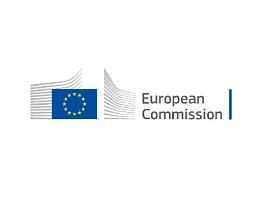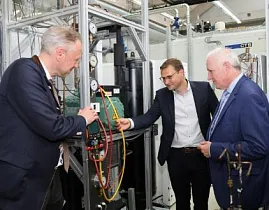NEDO and Daikin Industries Ltd. have completed an Automated Demand Response (ADR) demonstration system for air conditioning in the city of Lisbon, Portugal. The system, under development since November 2016, will start operation from July 2018.
The demonstration project is being conducted in collaboration with a Portuguese electric power retailer and a Virtual Power Plant (VPP) operator, who aggregates multiple small-to-medium power generation facilities of renewable energy. For this project, multi-split air conditioning systems for office buildings were equipped with cold storage units and a demand response function and installed in four public facilities in Lisbon, including City Hall.The upper limit of electricity consumption for the air conditioning systems is automatically controlled in response to the needs of the grid in balancing electric power supply and demand.
The project aims to establish business models for electric power retailers to maximize renewable energy usage during peak demand hours throughout the summer season using ADR technology. Consequently, the effectiveness of the system to ensure a stable supply of renewable energy will be evaluated.
Based on the project results, Daikin hopes to utilize ADR technology in conjunction with air conditioning systems in Portugal and other EU countries.

Overview
Portugal is one of the leading countries in Europe actively promoting the introduction of renewable energy such as hydro and wind power generation. In 2017, Portugal utilized renewable energy for approximately 44% of its entire domestic electricity consumption. In April of the previous year, demand for four consecutive days was entirely supplied by renewable energy, and earlier this year in March 2018, electricity generated from renewable energy sources surpassed the whole country’s monthly demand.However, the uncertainty of weather still makes it difficult to secure electricity generation from renewable energy sources, posing a major challenge for stable supply of electric power.
In this context, NEDO and the National Laboratory for Energy and Geology (LNEG) of Portugal signed a Memorandum of Understanding (MOU) to launch a project to demonstrate Automated Demand Response (ADR)*1 technology that could automatically adjust demand upwards or downwards in response to the power demand-supply balance. At the same time, NEDO concluded an Implementation Agreement (IA) with the city of Lisbon, designating facilities in Lisbon, including City Hall, as demonstration sites and selecting Daikin as an entrusted company.
Air conditioning systems in commercial buildings account for approximately 40% of all electricity consumption. With a focus on this fact, NEDO and Daikin Industries, Ltd. have installed multi-split air conditioning systems*2 equipped with cold storage units and a demand response function in four public facilities in Lisbon, including the City Hall, to demonstrate ADR technology.
Having completed development of the ADR demonstration system with air conditioning systems that started back in November 2016, NEDO and Daikin will now start the operation of the ADR system in the city of Lisbon.
Specifically, the upper limit of electricity consumption of air conditioning systems will be automatically controlled using cold storage units, allowing demand to be adjusted without jeopardizing end-user comfort. Due to the inherent intermittent production of renewable energy, having the demand side adjust to supply not only contributes to a solution for balancing the grid, but also enables large-scale deployment of renewable energy sources.
For the demonstration, a system to predict daily electricity demand based on available data, such as weather forecasts and daily air conditioning usage patterns, was developed to automatically control the operation modes of the air conditioning systems. The effectiveness of the system in adjusting supply and demand according to signals sent from partner companies*3 of ADR and Virtual Power Plant (VPP)*4 system will be verified.
The project aims to establish business models for electricity retailers to maximize renewable energy usage during peak demand hours throughout the summer season with the ADR system. Consequently, the effectiveness of system to ensure a stable supply of renewable energy will be evaluated.
A ceremony will be held at the Lisbon City Hall at 16:00 (local time) on June 29, 2018, to mark the start of operation for the project.
Glossary
- *1 Automated Demand Response (ADR)
A system for adjusting electricity consumption through automatic control of operating equipment from demand side operators and systems.
- *2 Multi-split air conditioning system
An air conditioning system utilizing a single outdoor unit to operate multiple indoor units independently and provide air conditioning only to rooms where it is needed.
- *3 Partners
Partners of the project are EDP Inovação S.A, Efacec – Energia, Máquinas e Equipamentos Eléctricos S.A. and Everis Portugal, S.A. in ADR system and MITSUI & Co., Arup and Next Kraftwerke in VPP system.
- *4 Virtual Power Plant (VPP)
A system that remotely controls and integrates several types of energy sources for distribution on the demand side in order to provide a reliable overall power supply.





